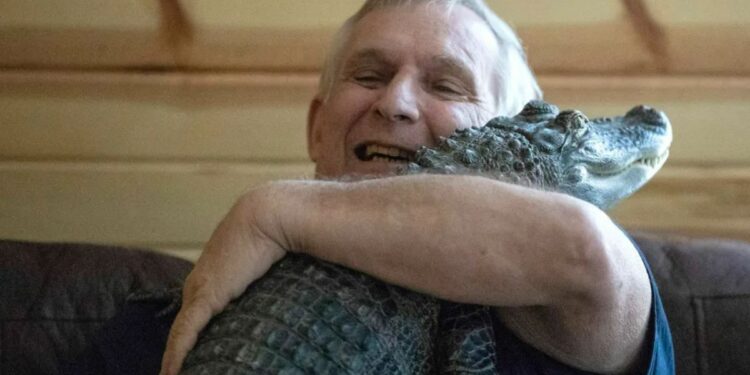A man from Pennsylvania, who has found solace in an alligator named Wally for almost ten years, is currently on a quest to locate his beloved reptile companion after it disappeared during a vacation to the Georgia coast.
Joie Henney attracts a large following on his social media pages, where he showcases his unconventional emotional support companion, Wally, the cold-blooded alligator. He frequently shares photos and videos of people affectionately interacting with Wally, whether it’s petting him like a dog or embracing him like a teddy bear. Wally gained even more fame when he was unfortunately denied entry to a Philadelphia Phillies game.
Henney expressed his deep distress after Wally disappeared during their April vacation in Brunswick, Georgia, a port city located 70 miles (112 kilometers) south of Savannah. Henney believes that someone may have taken Wally from the securely fenced outdoor enclosure where he was staying for the night on April 21.
Henney shared on social media that mischievous individuals had left Wally unattended at the residence of an individual who reported the incident to the authorities. Consequently, Wally, the alligator, was captured and subsequently released back into its natural habitat.
“We are desperate for any assistance to bring my baby back,” Henney pleaded tearfully in a heartfelt video shared on TikTok. “Please, we are relying on your support.”
When The Associated Press reached him by phone on Wednesday morning, Henney mentioned that he was unable to speak at that moment due to lack of time. He, however, did not respond to any follow-up messages promptly.
The man from Jonestown, Pennsylvania, stated that he got Wally in 2015 when the alligator was rescued in Florida at the age of 14 months. According to Henney, Wally played a crucial role in helping him cope with depression after the loss of several dear friends. He mentioned that his doctor, who was treating his depression, approved of Wally’s status as his emotional support animal.
According to Henney, the dog has never attempted to bite anyone.
According to representatives from the city and county police departments, no reports have been filed regarding the missing alligator in Brunswick and the surrounding Glynn County.
The Georgia Department of Natural Resources has confirmed that a nuisance alligator was reported by someone in the Brunswick area on April 21, which was the same day Wally went missing, according to Henney. In response to the report, a licensed trapper was sent to capture the alligator. The agency stated that the captured alligator was released in a remote location, but emphasized that it cannot confirm if it was Wally.
In Georgia, it is against the law for individuals to possess alligators without obtaining a special license or permit. The state Department of Natural Resources does not issue permits for keeping pet alligators. On the other hand, Pennsylvania does not have any state laws prohibiting the ownership of alligators. However, it is illegal for owners to release them into the wild, as stated by the Fish and Boat Commission.
David Mixon, a wildlife biologist and coastal supervisor for the Georgia Department of Natural Resources, has extensive experience dealing with alligators found in people’s yards and swimming pools. Additionally, he has educated school groups and Boy Scout troops by showcasing captive gators in his presentations.
According to the expert, even seemingly calm alligators can pose a threat. He emphasizes the importance of securely holding their mouths shut, either with a hand or, preferably, a band.
“They can be unpredictable and often react to stimuli,” stated Mixon. “There are numerous videos and pictures showcasing individuals handling alligators without getting hurt. However, the more time one spends around them, the higher the chances of sustaining an injury.”
Since 1948, Florida wildlife officials have documented over 450 incidents of unprovoked alligator attacks on humans. These attacks have resulted in more than 90 bites since 2014, with six of them proving fatal. Florida is home to approximately 1.3 million alligators.
According to Lori Kogan, a psychologist and professor at Colorado State University who specializes in studying the relationship between humans and animals, it is possible for alligators to be considered emotional support animals in places where they are allowed to be owned legally.
According to Kogan, emotional support animals differ from service animals in that they do not undergo specialized training to assist individuals with disabilities like blindness or post-traumatic stress. Unlike service animals, emotional support animals also do not have an official registry. However, individuals with diagnosed mental health conditions often receive letters of endorsement from health professionals to validate their need for an emotional support animal.
According to Kogan, individuals can form strong emotional connections with various animals. When asked if reptiles can provide comfort and evoke attachment, he affirmed that it is indeed possible. However, speaking from his own perspective, he admitted that he personally does not experience such a bond with reptiles.










